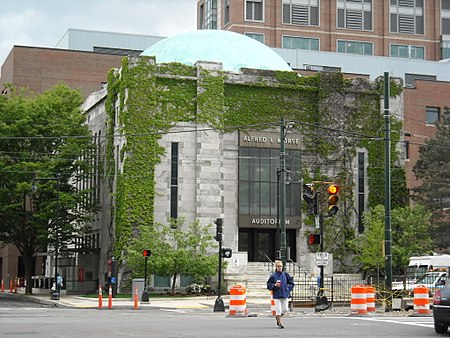Morse Auditorium

Alfred L. Morse Auditorium is a domed theater that is now owned by Boston University (BU) and used as an auditorium. Built in 1906 as Temple Israel, the edifice was intended by the architect and congregation as a replica of Solomon's Temple. Boston University acquired the building in 1967 when the congregation moved. In 1971, the building was named in honor of BU benefactor Alfred L. Morse, who was a member of the BU Board of Trustees from 1968 to 1973. The building is currently used for large lectures, events, and talks. The building is clad in white marble and today much of it is covered in vine. It was intended by the architect and congregation to be a replica of the Temple of Solomon.The building is adjacent to the Physics Research Building (PRB), Metcalf Science Center (SCI), and the Boston University College of Communication (COM).
Excerpt from the Wikipedia article Morse Auditorium (License: CC BY-SA 3.0, Authors, Images).Morse Auditorium
Amory Street, Boston
Geographical coordinates (GPS) Address Website Nearby Places Show on map
Geographical coordinates (GPS)
| Latitude | Longitude |
|---|---|
| N 42.3489 ° | E -71.1009 ° |
Address
Boston University
Amory Street
02215 Boston
Massachusetts, United States
Open on Google Maps









